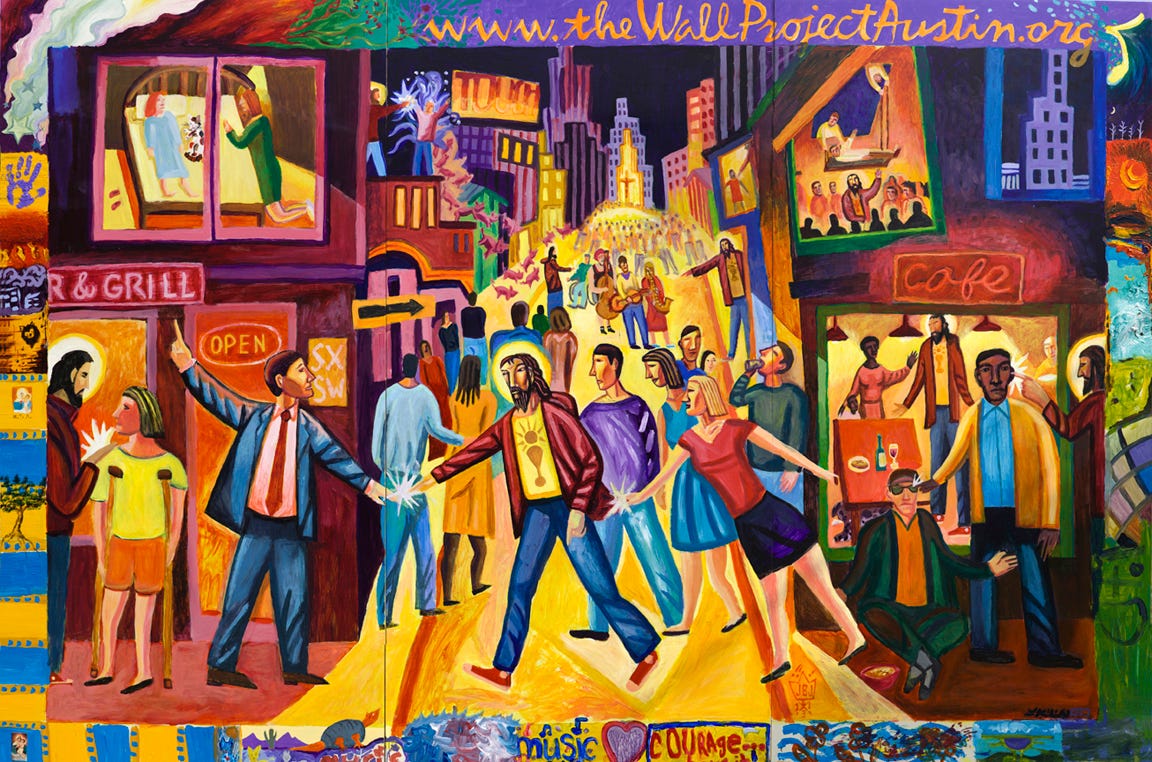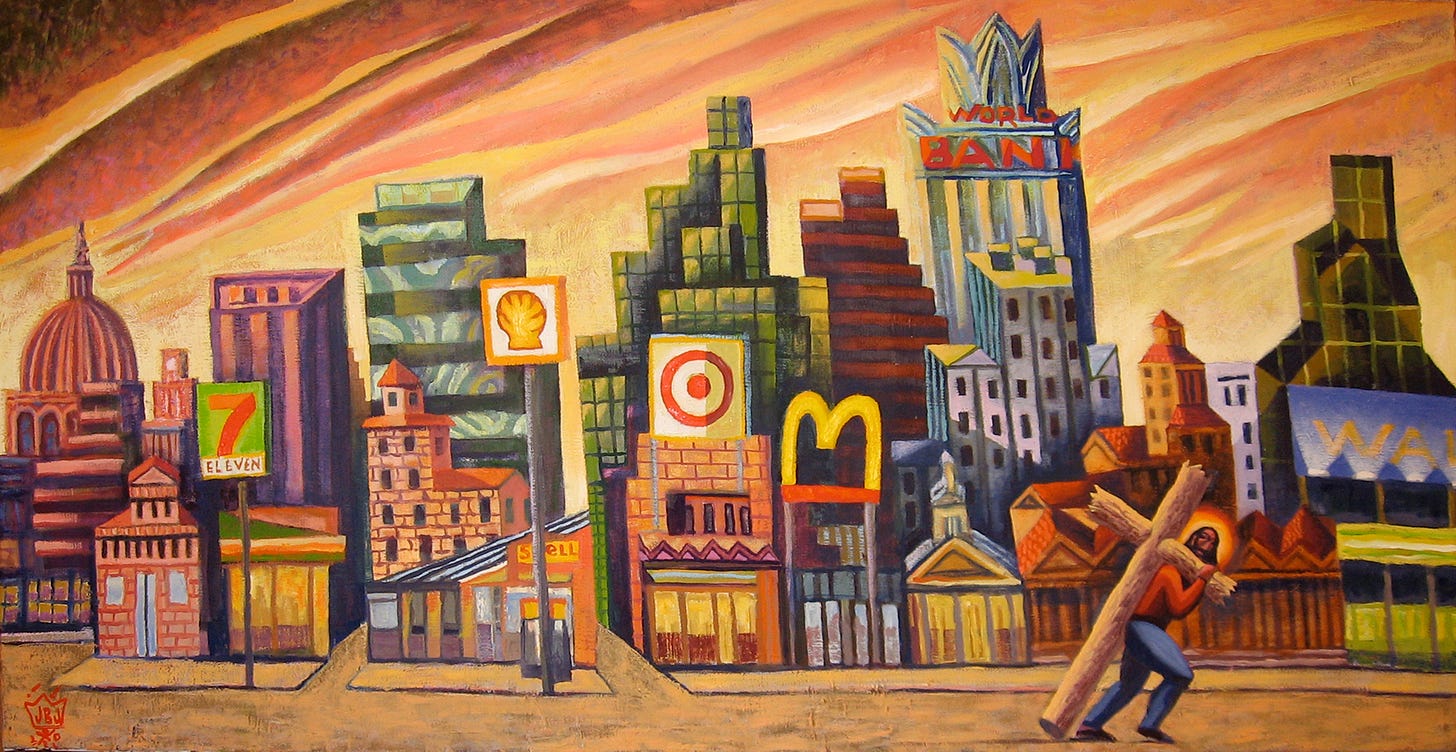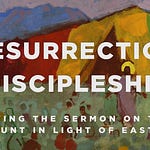“For Christ also suffered for sins once for all, the righteous for the unrighteous, in order to bring you to God.” – 1 Peter 3:18
Over the past four weeks, we have explored the living hope we have because of the empty tomb and Christ’s victory over death. While our Easter celebration may be a distant memory, the hope we hold because of the stone being rolled away fills us with the joy of God’s love. We rejoice knowing that the world's suffering does not hold the last word because all of creation is overcome by the new identity we have because of God’s grace – beloved for no other reason than God’s grace cuts through the labels the world tries to pin to you.
Today, as we approach Ascension Day – the day when the church remembers Jesus’ ascent to the right hand of God the Father, taking all of our humanness with him – we turn to the once and for all-ness of Christ’s life, death, and resurrection, which saves us in our disasters, not from them.
When we look at the gospels – Mark, Matthew, Luke, and John – it is easy to see that Jesus was always doing something.
Healing.
Teaching.
Traveling.
Turning water into wine.
And repeat.
Jesus went so far as to heal a man on the sabbath, landing himself in hot water with the religious powers of the day.
The rest of the New Testament is no different, as Paul’s letters can be read as a call to action. There are things that need to be done, urgent things of consequence.

There is indeed an urgency to ministry.
Emails and phone calls to return.
Committee meetings.
Events to plan.
Visits to make.
Children to baptize.
Worship services to plan.
Sermons to write.
And repeat.
There is busyness to the church's business, but all of our busyness distracts us from verse 18 – “once for all.”
Jesus suffered “once all.” That is from the New Revised Standard Version. I looked at other translations thinking there may be a more nuanced wording. The common word among the translations – New Revised Standard Version, New International Version, Common English, English Standard – is once. Jesus suffered and died “once for all” sins; yesterday, today, and tomorrow.
We live in the center of power in the most powerful nation on the planet. Many of us, color me guilty, have been programmed by the pace of life around here to always be on the lookout for the next thing to do. We fill in gaps on our calendars with work and productivity because if we look at the expected patterns of what it means to be successful, we assume busyness must be in the instruction manual. Busyness then becomes an addiction that consumes us, controlling everything from our workday calendars to our kid’s extracurricular activities.
“Sure, I’ll work through lunch,” we tell our bosses. Even though the boss never asked or expected us to do so.
“Oh, we’re free on Thursday evenings,” we say to our partners, “of course, we should sign the kid up for underwater basket weaving because that will give the five-year-old a leg up on the competition when it comes time for college applications.”
Our addiction to busyness spills over into the life of the church. “After all,” we tell ourselves, “Jesus healed, taught, traveled, turned water into wine, and repeated,” so we must go and do likewise. At times we think that to be a follower of Jesus is to drown ourselves in the busyness of the church, creating programs and processes, forgetting that the starting point for our life as Christ’s body is the “once for all” -ness of Christ’s life, death, and resurrection.
There is no amount of programs, committee meetings, or things we can do in the church that will give us more of God’s amazing grace.
There is no urgency to do anything in the church other than to proclaim God's amazing grace – the only urgency is the urgency of grace.
We just baptized Emma into new life through God’s amazing grace so that she may become a faithful disciple; to help her grow, learn, and navigate the questions that come up over the course of a lifetime of faith. You just made that promise, so when she has a question about the Bible, God, or the eschatological nature of the church, I am sending her to you. Emma was not baptized so that we would have another kid on the church rolls, in Sunday school, or to boost our end-of-the-year statistics. Emma was not baptized into the busyness of the church. Emma do not allow the busyness business model of the church to convince you that you need to do anything other than enjoy the grace of God. Emma, enjoy your forgiveness. Nothing more and nothing less.
The starting and ending point is grace.
We have gone astray the moment we trade God’s grace for the busyness of religiosity.
Robert Capon writes, “Everything religion tried (and failed) to do has been perfectly done, once and for all, by Jesus in his death and resurrection. For Christians, therefore, the entire religion shop has been closed, boarded up, and forgotten… The church, instead, is in the Gospel-proclaiming business. It is not here to bring the world the bad news that God will think kindly about us only after we have gone through certain creedal, liturgical and ethical wickets; it is here to bring the world the Good News that ‘while we were yet sinners, Christ died for the ungodly.’ It is here, in short, for no religious purpose at all, only to announce the Gospel of free grace.”[i]
No matter what the world tries to convince us about what our lives should be, we do not have to do anything to get to God because God has already come to us in the person of Jesus Christ. There’s no amount of programming, committee meetings, or church busyness that will get us closer to Jesus.
Jesus, contrary to our churchy and even secular expectations, saves us in our disasters, not from them. He does not reward and congratulate those who happen to win the self-improvement lottery. Instead, Jesus meets us in our sins and shortcomings and offers us grace. Jesus offers us a new business model for the church and this model is rooted in grace, forgiveness, and freedom.
Therefore, we are free to live our lives here and now without the burden of expectation and self-justification because Christ is enough. You are enough because Christ is enough.

That’s why we can call the Good News good.
We need only take a cursory glance at the gospels to see how Jesus, again and again, comes to the last, least, lost, little, and dead – scoundrels and saints (which sooner or later will include all of us) – in the brokenness of health, in the shipwreck of family situations, in the loss of hope, even in the thick of sin.
Our attention to the busyness of the life of the church is one of the ways that we distract ourselves from the consequence of our sin. It’s far easier, and more comfortable for us to attend to the needs of a committee over acknowledging the ways, that well, to be frank, we have harmed one another. But 1 Peter tells us that the “once for all” of Christ’s life, death, and resurrection frees us from the burden of our sin so that we can be the bearers of good news that we have been called to be.
The busyness of life that we are so attracted to is one of the ways that we bury our heads in the sand or attempt to at the very least so that we don’t have to come face-to-face with the suffering of the world, or the fact that there are those whose identity is not honored by the church.
But because Christ has died, because Christ has risen, and because Christ promises to come again, we are free from our sins, and from the busyness that we use as a distraction.
Or, as Paul puts it, “For while we were still weak, at the right time Christ died for the ungodly… God proves God’s love for us in that while we were still sinners, Christ died for us.”
Or, as 1 Peter put it, “For Christ also suffered sins once for all, the righteous for the unrighteous, in order to bring you to God.”
[i] https://mbird.com/theology/some-capon-to-tide-you-over-closing-down-the-religion-shop/




















Share this post